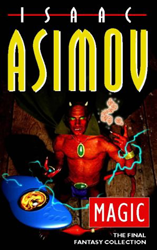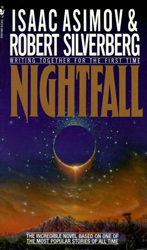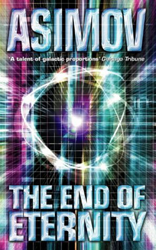Last night when we went out for a quick nightcap (of fries, onion rings and baked potatoes), we passed by the bookstore with just the thought of looking through books. Despite having such little budget, we came out with new books anyway.
When I saw Asimov’s Magic on the shelf, I distinctly remember an old friend recommending it so I knew I had to have it. Getting End of Eternity and Nightfall followed suit, since they were also new on the shelf and I only see the Foundation and Robot series usually on these shelves. So despite my wallet’s cries I bought them without hesitation and I am a happy little sci-fi geek.
And will commence to read them once I find the time. For the meantime, I give you a blurb about the books.
Magic

Isaac Asimov and science fiction are one and the same to millions of readers.He was the field’s transcendent genius, its reigning prophet, its genial patriarch, and its most prolific author. But Asimov also wrote fantasy, and invariably of an enduring quality. Magic is his final original collection, containing all of his uncollected fantasy stories that have never before appeared in book form.
In addition, this farewell collection of Asimov’s writings also includes his thoughts on the genre of fantasy itself. Here are the fascinating musings of a wide ranging intelligence, discussing everything from Tolkien to Spielberg, from Unicorns to King Arthur, from the difference between maidens and damsels to the speed of Seven League Boots – scientifically calculated at last!
Nightfall

This collaboration by two masters of the genre expands on Asimov’s classic short story first published in 1941. Kalgash is a planet with six suns, a world where darkness is unnatural. Scientists realize that an eclipse–an event that occurs only every 2049 years–is imminent, and that a society completely unfamiliar with darkness will be plunged into madness and chaos. The novel traces events leading to this discovery, and the fates of the main characters immediately following the apocalypse. While the premise is convincing in the context of a short story, this longer version brings up too many unresolved questions. The original tale was tightly written, succinct and stunning, but the novelization seems flabby and drawn-out–the reader recognizes the significance and consequences of the impending events long before the characters do. An abrupt and simplistic ending further mars a hallowed SF tale. 100,000 first printing.
End of Eternity

Andrew Harlan is an Eternal, a man whose job it is to range through past and present Centuries, monitoring and, where necessary, altering Time’s myriad cause-and-effect relationships. But when Harlan meets and falls for a non-Eternal woman, he seeks to use the awesome powers and techniques of the Eternals to twist time for his own purposes, so that he and his love can survive together.
Now, finding a good copy of Ender’s Game (at least) by Orson Scott Card will make my life complete.